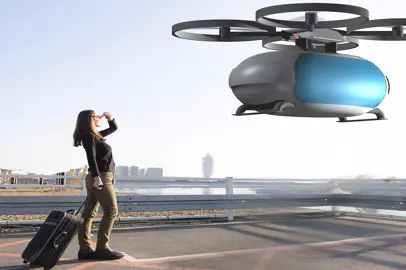04 April 2018
The right to fly safely
Interview with the President of ENAC - Italian Civil Aviation Authority - Hon. Prof. Vito Riggio
Frequent flying, for both tourism and business, is now a part of everyday life. It’s become so simple: you choose the destination and airline, purchase your flights, travel to the airport and depart. Behind these choices is a world that works to ensure all services operate correctly. But there are also authorities that control quality, oversee security and safety and monitor passengers’ rights.
We spoke about this with the President of ENAC - Italian Civil Aviation Authority - Hon. Prof. Vito Riggio.
The protection of services and air transport are, together with security, the backbone of the institutional mandate of the ENAC, which is additionally responsible for ensuring that European legislation on passenger rights is implemented effectively.
How does ENAC ensure that European legislation on passenger rights is effectively applied?
It’s been since 2001 that the Authority drew up the first Passenger Rights Charter, one of the first European authorities to do so. Following this, European Community Regulations, no. 261 in 2004 and no. 1107 in 2006, were issued to ensure protection in the event of air transport inefficiencies and the rights of passengers with reduced mobility. With respect to these regulations, ENAC also has the power to impose administrative sanctions against non-compliant parties.
In addition to protecting the rights of all passengers, our Board also approves and controls the implementation of the Airport Services Charter, which concerns the level of quality of services provided to users.
Furthermore, the improvement of quality goes hand in hand with airport investments, without which the requirements on which the planning agreements between the authority, representing the State, and the airport concessionaires are based would not be met. ENAC monitors the investments included in the agreements.
What is the role of ENAC in the event of a disservice?
ENAC is called to intervene only in second place. The role of ENAC, in fact, is not aimed at satisfying the passenger's claims for compensation, nor in providing legal assistance or consultation services. The claim must be submitted in the first instance to the airline. If the airline does not respond within 6 weeks, or provides an unsatisfactory response, the passenger can file a complaint with ENAC, which has been identified by the European Commission as the Body responsible for the correct application of the EU regulations protecting the passenger's rights, with the power to impose administrative sanctions against defaulting airlines.
I would like to point out that any reporting of disservices at the national airports or determined by the airlines allows us to monitor critical issues and take action against operators with the aim of constantly improving the services to users.
Passenger traffic data is continuously increasing. What should be done today, in your opinion, to improve the performance of air transport (airlines, airports, infrastructures) and continue to offer high quality services and security?
With regards to our country, I would say first that we should understand that the system must be integrated and think of transport and infrastructure as a global system based on intermodality, and not divided into single components that do not interact with each other.
The sector, as a whole, would offer a better service to the citizen if it favoured the journey in its entirety, protecting the people who have the most difficulties and granting them the right to mobility. Added to this is the need for national airlines that are able to offer and guarantee the connectivity required by the market while taking into consideration environmental protection.
Looking to the future, how do you see the development of air transport in the coming years?
Regarding air traffic in Italy there are important estimates that, in line with forecasts made at the European level over the medium to long term, lead to predict that in 2030 we will be reaching the 250 million passenger threshold.
This important development must be combined with the topic of the sustainability of air mobility both in terms of infrastructure and compatibility with the environment.
Moreover, given that the traffic trend is one of the indicators of the economic development of a country, I hope that the sector will be regarded with greater importance at a political and industrial level.
Considering the sector’s continuous evolution, how do you envision the journey of the airport passenger will change in the short and long-term future?
In a period of just a few decades we have moved from air transport being something available to a few, to it being an everyday occurrence, thanks to the low-cost model, which has revolutionized the approach to flight, and globalization, which is characterizing our lives.
Even airports have turned into microcosms where the passenger feels like he is in a real city with almost all the activities found in a social context.
Before the arrival of sub-orbital flights, on which ENAC is already working, and which for the moment are intended for freight transport, I hope that increasing attention will be paid to passengers’ needs, with operators that further improve and integrate all the products and services related to the travel experience.
Text by Angela Trivigno
Interview of march 2018, published on Avion Tourism 66/2018
Photos: Sisterscom.com, Shutterstock
Copyright © Sisterscom.com
Photos: Sisterscom.com, Shutterstock
Copyright © Sisterscom.com
You might be interested in
Useful Info

Authority
ENAC launches the first European U-Space
From 1 January 2026, the "U-Space San Salvo", the first in Europe, will be operational: an airspace for manned flights and remotely piloted flights of unmanned vehicles for experimental activities and emergency operations
Useful Info

Authority
HyperTwin Leads the Evolution of Future Air Mobility
Enac: HyperTwin will help redesign the airspace in the coming years for drones, eVTOLs, advanced, urban, territorial, safe and sustainable air mobility
Useful Info

Authority
Airport infrastructures and air transport development: the focus of CESISP at Bicocca and the contribution of ENAC
At the University of Milano-Bicocca, CESISP analyzes the role of airport infrastructures for growth, public finance and the country's competitiveness; ENAC Director General D'Orsogna recalls infrastructural capacity as a lever of the "Italian model"

